699 Search Results for communication book
August 10, 2013
by Robin Parker -
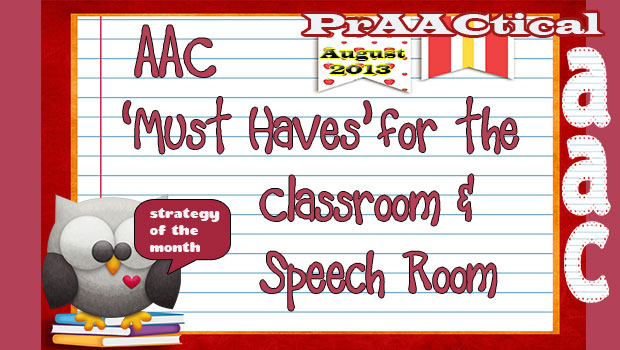
As we were getting ready for back to school and thinking about ‘must haves’, it quickly became apparent that it is not so easy to narrow it down. And the ‘must haves’ would definitely vary depending upon type of class, students, and even school. Based on a wide variety of differences, we organized a wide variety of choices to explore (we apologize in advance if we got carried away but…). Choose what you need, bookmark what you may need later and let us know your ‘must haves’ for a classroom and speech room AAC collaborative approach. We will create an ongoing list. Get Started Before School Starts Do these 10 Things to Get Started with AAC if you are new to an AAC student or classroom Provide AAC Support in the Classroom. Support teachers and educators with tips from Jane Farrall, & learn about AAC in the Classroom by Joan... [Read More...]
July 20, 2013
by Robin Parker -
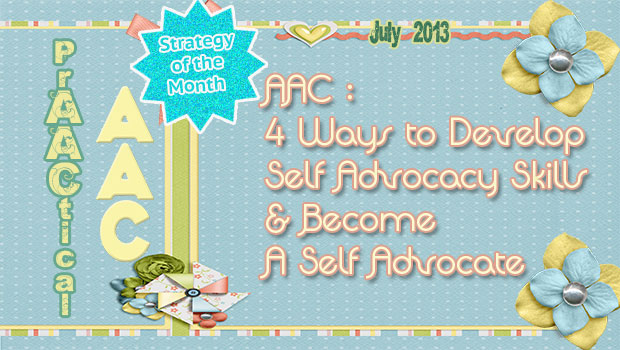
Self Advocacy comes in many shapes and forms for all learners. We all need to have a level of self advocacy skills to have a positive self-esteem, to continue a path of life long learning, and to defend and protect ourselves in situations that potentially can be harmful. The teaching of self advocacy begins with learning to request and protest but goes way beyond that for ALL learners. For those with AAC needs, specific strategies and direct instruction are often necessary to make self advocacy a comprehensive and robust skill. Self advocacy skills are a priority for older learners so for our Strategy of the Month, we will discuss some ways to help develop self advocacy skills beyond the requesting and protesting levels. We hope to build strong self advocacy skills for ALL learners. Rating Scales– Teach the use of rating scales to help AAC learners give their opinions on... [Read More...]
July 5, 2013
by Robin Parker -

Strategy of the Month AAC Assessment for People with Aphasia Communication Books & Aphasia Speech Supplementation Strategies Aphasia, Supported Communication, Written Choice Strategy, + Variations Making it Work: 6 AAC Strategies for People with Aphasia PrAACtical Thinking Be Chatty: 5 Tips for Supported Conversation 5 PrAACtical Thoughts on Catch-Up Conversations 31 Posts You May Have Missed in May Where to Get PrAACtical Research Reviews Supporting the Use of AAC Listen to Me About What I Need and Want It’s PrAACtically Fathers Day PrAACtical Summer Learning 5 Questions about Aphasia & Communication Books Safety Matters: 5 Resources for People Who Use AAC Weighing The Evidence PrAACtical Evidence on Presuming Competence Helping People with Aphasia Compensate for Their Language Difficulties with Dr. Kristy Weissling PrAACtical Summer Activities AACtual Therapy/ How I Do It Go Fish with AAC and Shareka Bentham Marlene Cummings Shares and Implementation Toolbox Use your Best Spud to Teach Vocabulary... [Read More...]
June 29, 2013
by Carole Zangari -
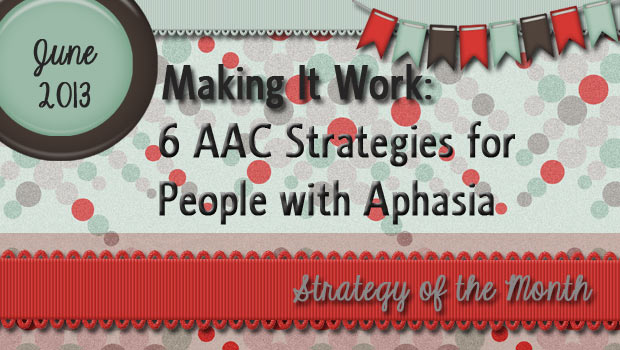
People with aphasia are often most successful when a number of different strategies are combined. In this post, we discuss a number of strategies that we can use in our therapy and teach to communication partners. Augmented Input We’ve written so many posts about aided language input that we’re almost embarrassed to bring it up again. Almost. It seems like no matter which age group or clinical population is the subject of our post, that strategy plays a central role. It is the same for people with aphasia with one exception. They benefit from a broader array of input cues, such as gestures, writing, and even pantomime. Augmented input is the term that is used to refer to oral language that is supplemented with pictures, print, gestures, pantomime, and the use of objects in the environment. By using these things as you speak, you enhance the ability of the person... [Read More...]
June 20, 2013
by Carole Zangari -
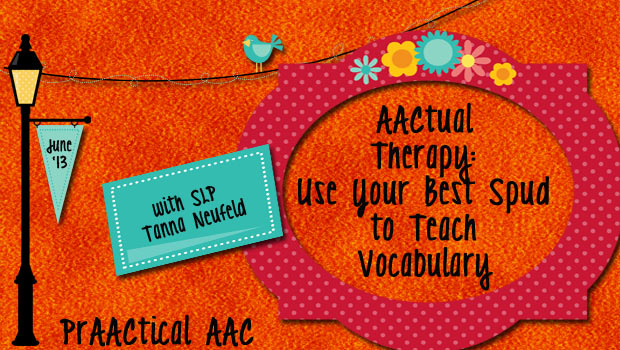
AACtual Therapist Tanna Neufeld comes through again, putting a prAACtical touch on an activity we all know and love. Tanna has generously shared both her ideas and the communication boards that she uses for this activity. You can download them in our eToolBox or go to the links at the end of this post. Tanna has great intervention tips (love her 80/20 idea!) that are prAACtical and effective for keeping kids engaged and learning. Mr. Potato Head is one of my favorite therapy tools for working with all kids, but especially beginning communicators. This awesome spud is not only a versatile toy-ripe for building, pretending, and interacting-but also a great tool for modeling vocabulary. For those little ones that you can keep engaged beyond the putting in and out of the building stage (tap into that good old fashioned, therapeutic use of self!), this toy really goes the distance. I... [Read More...]
June 4, 2013
by Carole Zangari -
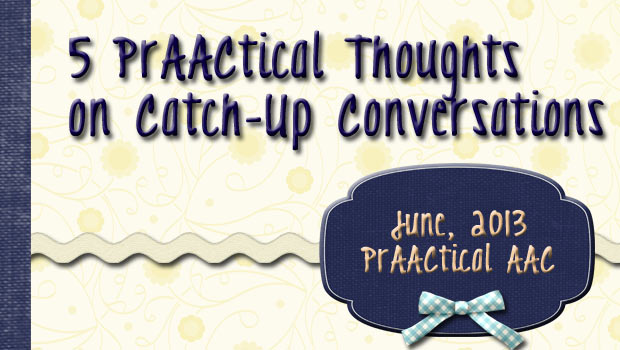
One of the things SLPs frequently do at the start of their therapy sessions is have some casual conversations with their clients to catch up on what happened since their last visit. Whether it is an elementary school student with ASD, a teenager with cerebral palsy, or an older adult with aphasia, we engage in polite conversation to find out what they’ve been up to and perhaps share a bit about our own experiences. Here are some thoughts on making those ‘catch-up conversations’ work from a prAACtical perspective. 1. Possible goal areas: initiate conversation; maintain dialogue on an established topic; redirect conversation to a new topic; respond to non-obligatory communication opportunities; use temporal terms in multi-word utterances; convey a personal narrative with a clear beginning, middle, and end; use regular past tense verbs; ask partner-focused questions 2. Core language targets: it, we, they, do/did, have/had, was/were, not It was (not);... [Read More...]
June 1, 2013
by Carole Zangari -
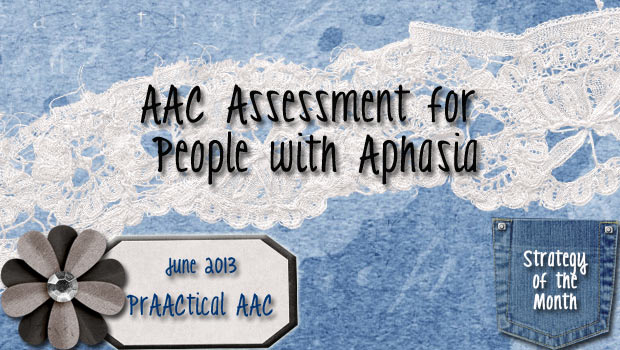
Many people with aphasia fail to regain sufficient speech and language skills to meet their communication needs. With more than one million people with aphasia in the US alone, chances are most people reading this know at least one person affected by the disorder. While many go on to regain functional speech and language skills, some remain unable to communicate well enough catch up with a neighbor, talk about bills with a spouse, ask a question in a store, play with a grandchild, or tell their healthcare providers about side effects or symptoms. It’s hard to really imagine how devastating and isolating this experience may be. Aphasia Awareness Month seemed like the perfect time to reach out to SLPs with information on AAC for people with aphasia. In this post, we’ll share some thoughts and resources on assessment. Assessment activities are, of course, driven by the purpose for which the... [Read More...]
May 28, 2013
by Robin Parker -
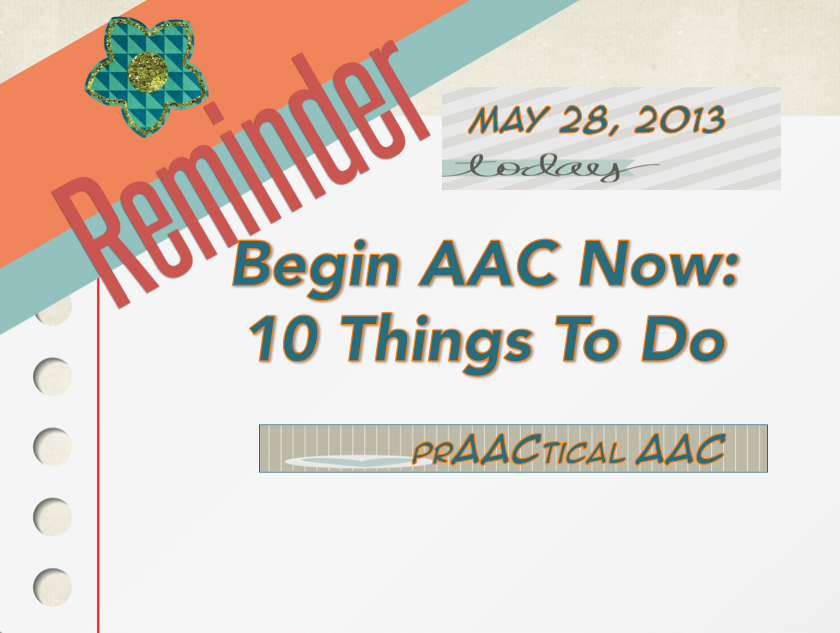
If you know someone with significant speech difficulties, BEGIN AAC NOW…. If you know someone, try something… Doing something, even if it isn’t perfect, is infinitely better than doing nothing at all…. There is no specific order for these suggestions, try what is appropriate and doable for you… A year from now you may wish you started today (K. Lamb)… So begin now at any level.. for someone, a class, a clinic, for a few… Create a Visual Language & AAC Environment: Visual Immersion Program, Meaningful Language Experiences, Importance of Using Visual Supports Speak AAC to the AAC Learner: Use Aided Language Input (ALI), Learning to Use ALI Get Assessment Information: Communication Matrix , AAC Evaluation Genie, Thoughts & Ideas, AAC Assessment Forms, Write & Implement Some AAC Goals: Goals That Matter, AAC in the IEP by Lauren Enders, PrAActical Goals Learn and Use a Core Word Approach: Core Word Communication Board Samples, About Core Words- First... [Read More...]
May 25, 2013
by Robin Parker -
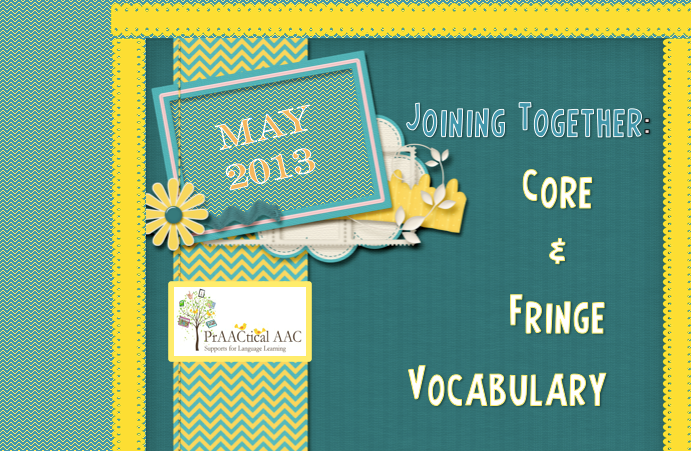
Last month we talked about Core Words, and we shared core word samples, philosophies, and resources. As we have moved into May’s Strategy of the Month, Communication Boards, we now want to share ideas about joining core and fringe words together on communication boards. Core vocabulary are those words used with high frequency and make up about 75-80% of the words we use everyday. Core vocabulary should be a main part of all AAC systems because it allows for most flexibility across most situations. With an emphasis on core words, we also use Fringe Vocabulary 20-25% of the time. Fringe vocabulary are used in a continuum of low-frequency to lower frequency situations (e.g., ‘mountain’: ‘glacier’, ‘crevasse’). Personal vocabulary can also be included under fringe vocabulary and would relate to personal words someone might need for their individual needs, interests, work, school, or even community. So, in the best communication world, AAC users would have access... [Read More...]
May 23, 2013
by Carole Zangari -
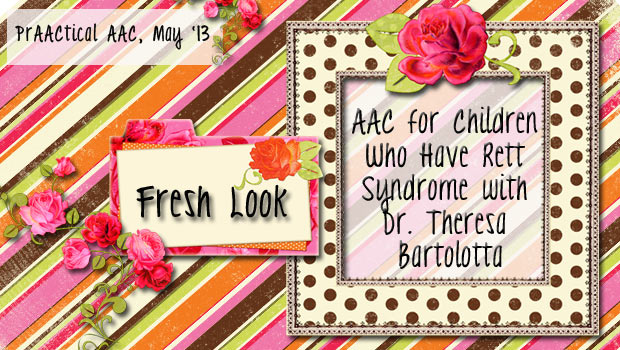
In our SLP training programs, few of us learned about Rett Syndrome or how to provide services to children with that disorder. We’re so pleased to have a guest post on AAC services for children with Rett by Dr. Theresa Bartolotta, Director of Assessment in the Office of the Provost, and Associate Professor in the Department of Speech-Language Pathology, at Seton Hall University, in South Orange, New Jersey. An SLP with over 30 years of clinical experience, she specializes in communication disorders in children with significant disabilities with a special interest in autism and Rett syndrome. Our field is still learning about Rett syndrome and we are still discovering new things about the range of skills and abilities present in the children who have it. In this post, Dr. Bartolotta gives us some background about the syndrome and discusses implications for treatment. I am thrilled to have this opportunity to post... [Read More...]









